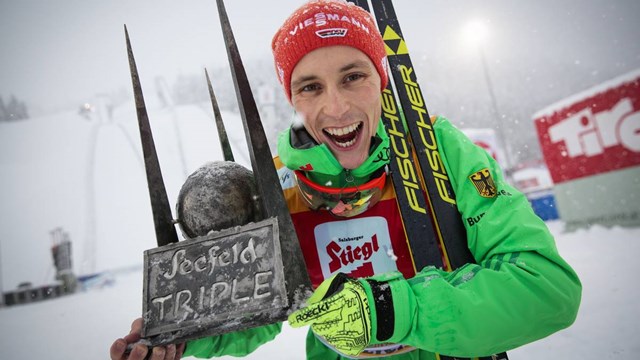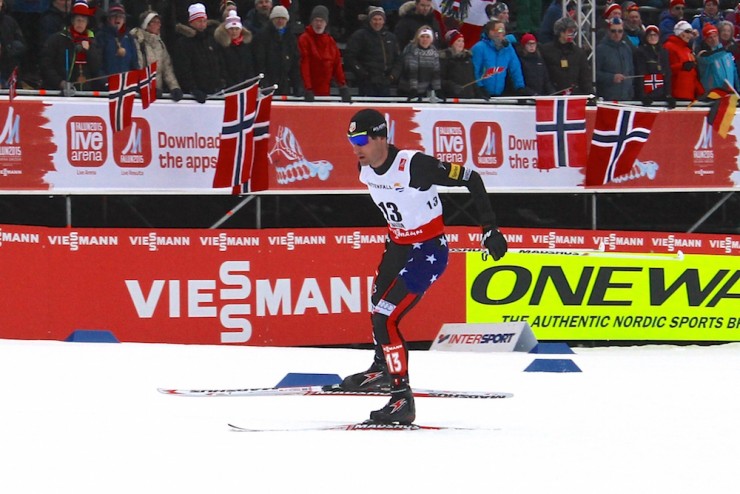
Jump. Ski. Jump. Ski. And in Seefeld, Austria, this past weekend, it was an added bonus round of jumping and skiing for the three-day Nordic Combined World Cup.
Held Friday through Sunday, the series of competitions, known as the Seefeld Triple, is a highlight of each nordic-combined season as the racing format winnows the best of the best.
The Seefeld Triple is set up as a race of attrition.
Day 1 featured a normal-hill jump coupled with a 5-kilometer ski race. The top 50 finishers advanced to Day 2, with another jump on the 109-meter normal hill and a 10 k race. Only the top 30 advanced to Day 3, which included another normal-hill jump and 10 k Gundersen start.
The results from Day 1 set the tone for the weekend. The names of German Eric Frenzel and Japan’s Akito Watabe would consistently top the Triple’s results.
During the jump on Day 1, Watabe flew the farthest, earning 131.3 points, while Frenzel came in a close second with 133.2 points. Norwegian Jarl Magnus Riiber finished the jumping round in third, but was eventually disqualified for starting the cross-country race without a transponder. His teammate Magnus Moan had been previously disqualified on Friday for his jumping suit being 1 millimeter too loose.
For the U.S. Nordic Combined team, the pressure was on from the start. The Seefeld Triple marked the end of the period during which the team can start five athletes. That five-man quota was a result of points earned last season as well as additional spots earned from the team’s results during the Continental Cup in Utah last December.
On the first day of competition in Seefeld, American Ben Berend posted the 33rd-best jump. His teammates Bryan Fletcher followed in 34th, Adam Loomis in 43rd, Jasper Good in 49th, and Taylor Fletcher in 53rd.
If it wasn’t clear from the jumping, the ski race was where Frenzel and Watabe made others realize that, by Sunday’s racing, it would simply be a race for third.
Watabe began eight seconds ahead of Frenzel, while Berend and Bryan Fletcher, the closest Americans, began 1:21 and 1:26 minutes back, respectively.
Steadily, Frenzel and Watabe built a gap by the finish line. Frenzel finished first in 11:08.5, while Watabe crossed the line 6.2 seconds later in second place. Germany’s Fabian Riessle skied to third (+43.6). Bryan Fletcher moved up in the field after starting 34th, finishing 20th (+1:07.5) with the third-fastest ski time on the day.
The next-best placed American was Loomis, who skied to 42nd (+2:16.4). Berend placed 43rd (+2:17.9), Taylor Fletcher 47th (+2:26.6), and Jasper Good 50th +2:32.8). Despite only Bryan Fletcher scoring World Cup points, the entire U.S. Team finished in the top 50 to earn starts in the Triple’s second day of competition.
In an email to FasterSkier on Sunday, Bryan Fletcher wrote he was surprised with his fast ski time on Friday.
“Going into Seefeld I was a bit nervous,” he wrote. “I came down with a really weird virus on Thursday in the provision comp round. I almost didn’t start because I was so dizzy during the jumping. But I wanted to make sure I had a result on the page just in case knowing the weather on Sunday would be challenging.
“So Thursday I went to bed early in the hopes that Friday it would pass as quickly as it came on,” he continued. “Luckily I felt better in the morning, Still had some slight symptoms but compared to the day before it was much better. Having such a fast race after the sickness was surprising but it gave me the motivation to keep pushing as the weekend went on.”
Day 2: A Leap Frog

The jumping was a virtual repeat for Watabe and Frenzel on Day 2. Watabe posted the best jump, with Frenzel a close second. Austria’s Bernhard Gruber ranked third.
As far as the contenders for the Seefeld Triple’s overall, this wasn’t much of a surprise. Coming into Saturday’s competition, Frenzel ranked second in the overall World Cup standings behind Germany’s Riessle, while Watabe was third.
The top American from Day 1, also kept himself in a top-10 hunt. Bryan Fletcher jumped to 16th and would start the ski race 1:40 behind Watabe. Behind him, Berend started 35th based on his jump, Loomis 42nd, Taylor Fletcher 47th, and Good 50th.
Watabe began Saturday’s 10 k four seconds ahead of Frenzel, while Gruber started nearly a minute back.
That minute gap the leaders’ began with only grew. The chase for Frenzel and Watabe remained unorganized, with little agreement as to who would set the pace. The chasers expanded from as little as four skiers to over a dozen — including Bryan Fletcher. Beginning the final loop, Fletcher led out the chasers.
Near the end, after the top two had skied alone, Frenzel attacked and dropped Watabe to take the win by 24.9 seconds in 23:11.5. Nearly a minute after Watabe, Riessle finished third (+1:27.7).
Bryan Fletcher had an opportunity to reach the podium. On the final climb, Riessle and Norway’s Jørgen Graabak hammered, giving themselves a few seconds margin. During that push, there was a small tangle behind. It caught Fletcher, briefly turning him sideways — yet he didn’t fall. That mishap cost him time and places. He finished ninth, 1:36 behind and only 8.3 seconds out of third. Fletcher tied for the sixth-fastest ski time on the day.
“Unfortunately at the end I had my poles stepped on and that took me out of contention for 3rd place. Sometimes racing can be unlucky but I was happy to stay in the top ten despite the mishap at the end,” Fletcher explained.
The remaining four U.S. athletes finished outside the top 30: Loomis in 37th (+4:23.5), Taylor Fletcher in 41st (+4:49.6), Berend in 44th (+5:17), and Good in 46th (+6:21.3).
The day’s results meant a few things, both positive and negative.
On the downside, Bryan Fletcher was the only American to advance in the top 30 to Day 3.
Then there was the positive. If nordic combined was a sport married with betting, like football in the U.S., Frenzel would be as safe a bet as you could get.
Saturday marked Frenzel’s 10th-straight win in Seefeld. That’s dating back to 2013. The “triple” format was introduced there in 2014 — and Frenzel has owned it since. He won the first two editions of the Seefeld Triple, in 2014 and 2015, and kept the momentum going into Sunday.
In addition to firming his grip on 2016’s Triple, heading into Sunday’s final day of racing, Frenzel had leap frogged Riessel, to rank first in the World Cup standings by 17 points.
Day 3: Frenzel on the Watabe Hunt
It wasn’t exactly ideal conditions for the final day of jumping and racing at the Seefeld Triple. With steady snow and unpredictable winds, the jump was delayed several times, until organizers sent the field of 30 skiers off the hill.
Once again, Watabe dominated. Frenzel was the next best jumper. Yet in the tricky conditions, he botched his landing. Although he was only half a meter down on Watabe in distance, the fall gave him a lower overall score, and thus a cross-country ski start time 56 seconds behind Watabe. Riessle rounded out the top-three jumping spots in third, putting him 1:26 back for the ski race.
Bryan Fletcher jumped to 16th and started the race 2:24 behind Watabe.
With snow falling and several inches of snow on the course, race officials shortened the planned 15-kilometer race to 10 k. Either way, Frenzel had a tough task ahead of him. But as the race unfolded, stride by stride, Frenzel reeled Watabe in. Starting the final loop, Watabe still had roughly a thirty-second margin.
That proved not enough.
Frenzel eventually passed Watabe, winning by 18.7 seconds in 26:45.8. Watabe took second and Riessle, the third place finisher on Day 1 and Day 2, once again placed third (+1:09.1).
Bryan Fletcher jetted to the fastest time on the day in 25:38.6. That effort earned him seventh in the Seefeld Triple, just 7.7 seconds off the podium.
Yay! 3rd year in a row I have finished top 10 in the @fisnc #Triple 7th place today, fastest time too! @USA_NoCo pic.twitter.com/9wqwekf17N
— Bryan Fletcher (@SkiFletch) January 31, 2016
Fletcher leaves Seefeld knowing his form is good, but also with the understanding that the U.S. team’s goal of maintaining quota spots remained elusive.
“Today was a very tough day on the jump hill,” he wrote on Sunday. “The snow was very heavy and wet and it make the organizers work hard to get the comp off. In the end though it was a good competition and I was happy to have a jump that kept me in the fight for the race.”
Considering Sunday’s tough snow conditions, Fletcher knew that suited him. He aimed to ski hard and try to catch the chase group “and at least have a shot at the sprint for 3rd,” he wrote.
“Seefeld has been good to me, I have been top 10 in the triple now three times [placing ninth in 2015 and fifth in 2014] so I know this weekend showed positive trends,” he continued.
“Unfortunately the team will lose a number of spots after this weekend. With the cancellations of many world cups in second period it didn’t give our team much opportunity for the guys to score points. They really only got two chances, Chaux Neuve and Seefeld. They put in a good fight this weekend given that it’s not easy to make the third day. So at this point our team will have two start rights in Oslo and Trondheim.”
Fletcher’s melancholy was offset by the vibe on the German side, which was celebrating Frenzel’s long-weekend domination.
“We have a tradition in the hotel here,” Germany’s head coach Hermann Weinbuch told German broadcaster ARD. “The innkeeper opens champagne [bottles] with a saber, and if we win another Triple we will keep up that tradition and drink a glass of sparkling wine or champagne.“
Frenzel now leads the overall World Cup with 671 points, 97 points ahead of Riessle in second and 117 ahead of Watabe.
World Cup competition continues next weekend in Oslo, Norway.
Results: Day 1 | Day 2 | Day 3 | Overall World Cup standings
Jason Albert
Jason lives in Bend, Ore., and can often be seen chasing his two boys around town. He’s a self-proclaimed audio geek. That all started back in the early 1990s when he convinced a naive public radio editor he should report a story from Alaska’s, Ruth Gorge. Now, Jason’s common companion is his field-recording gear.



